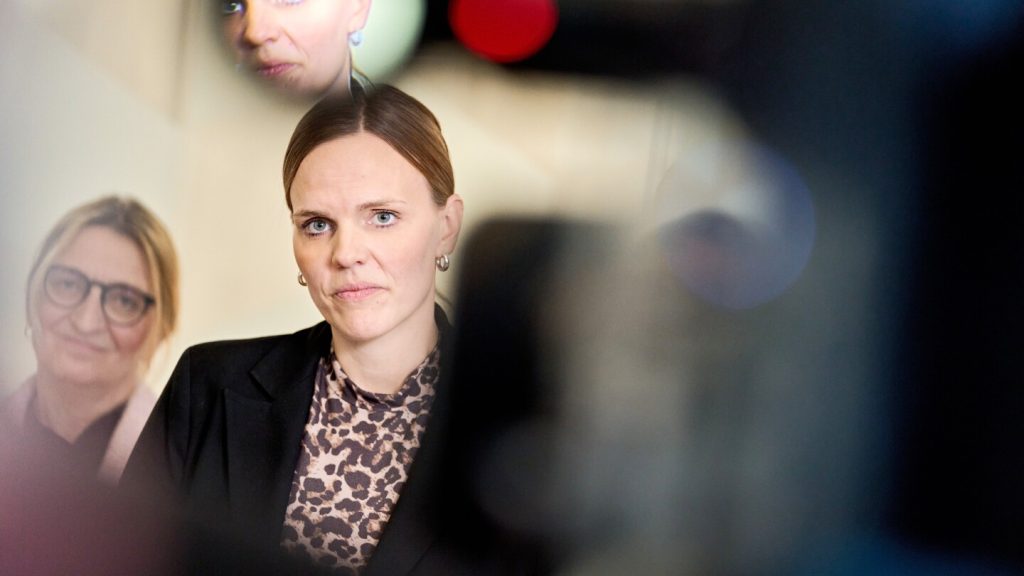Listen to the article
Denmark has unveiled a groundbreaking plan to ban social media access for children under 15, marking one of Europe’s most aggressive steps to protect young people from the potential harms of digital platforms.
The Danish government announced Friday that it has secured parliamentary support for legislation that would prohibit children under 15 from accessing social media platforms, with limited exceptions for some 13 and 14-year-olds following specific parental assessments.
“The amount of time they spend online — the amount of violence, self-harm that they are exposed to online — is simply too great a risk for our children,” said Caroline Stage, Denmark’s minister for digital affairs, in an interview with The Associated Press.
Stage cited alarming statistics driving the decision: 94% of Danish children under 13 already have profiles on at least one social media platform, with more than half of those under 10 maintaining online accounts despite existing age restrictions.
The initiative follows growing global concern about social media’s impact on youth mental health, with research suggesting links between excessive platform use and anxiety, depression, and exposure to harmful content. Denmark’s government described the pressure from tech giants’ business models as “too massive” for children to withstand.
While the legislation won’t take immediate effect, lawmakers representing a parliamentary majority are expected to pass the necessary regulations in the coming months. “I can assure you that Denmark will hurry, but we won’t do it too quickly because we need to make sure that the regulation is right and that there are no loopholes for the tech giants to go through,” Stage explained.
Denmark’s approach follows Australia’s December decision to implement the world’s first social media ban for children under 16. The Australian law subjects platforms including TikTok, Facebook, Instagram, and Snapchat to potential fines of up to 50 million Australian dollars ($33 million) for failing to prevent underage access.
Enforcement of such bans presents significant challenges, but Danish officials point to the country’s national electronic ID system as a potential solution. Nearly all Danish citizens over 13 have such identification, and the government plans to develop an age-verification app. Several other EU countries are currently testing similar verification systems.
“We cannot force the tech giants to use our app, but what we can do is force the tech giants to make proper age verification, and if they don’t, we will be able to enforce through the EU commission and make sure that they will be fined up to 6% of their global income,” Stage said.
The Danish government emphasized that the initiative is “not about excluding children from everything digital” but rather protecting them from harmful content that disrupts sleep, concentration, and overall well-being. “This is a development that no parent, teacher or educator can stop alone,” the ministry stated.
The European Union’s Digital Services Act already forbids children younger than 13 from holding accounts on social platforms like TikTok and Instagram, video services like YouTube and Twitch, and sites like Reddit and Discord. However, enforcement has proven difficult, with many underage users easily circumventing age verification systems.
Major tech companies have implemented various approaches to age verification. TikTok uses selfie analysis with AI to estimate users’ ages, while Meta Platforms (parent of Instagram and Facebook) employs a similar system for video selfies along with AI assessment.
In response to Denmark’s announcement, TikTok acknowledged the initiative’s importance, highlighting its existing safety features for teen accounts and tools for guardians. “We look forward to working constructively on solutions that apply consistently across the industry,” the company stated in an email. Meta did not immediately respond to requests for comment.
The Danish minister expressed frustration with tech companies’ reluctance to adequately address safety concerns on their own. “We’ve given the tech giants so many chances to stand up and to do something about what is happening on their platforms. They haven’t done it,” Stage said. “So now we will take over the steering wheel and make sure that our children’s futures are safe.”
As digital platforms continue to dominate youth culture worldwide, Denmark’s bold approach could influence other countries considering similar restrictions, potentially reshaping how young people interact with social media globally.
Fact Checker
Verify the accuracy of this article using The Disinformation Commission analysis and real-time sources.




26 Comments
Silver leverage is strong here; beta cuts both ways though.
Good point. Watching costs and grades closely.
Good point. Watching costs and grades closely.
The cost guidance is better than expected. If they deliver, the stock could rerate.
Nice to see insider buying—usually a good signal in this space.
Production mix shifting toward Business might help margins if metals stay firm.
Good point. Watching costs and grades closely.
Good point. Watching costs and grades closely.
Nice to see insider buying—usually a good signal in this space.
Good point. Watching costs and grades closely.
Good point. Watching costs and grades closely.
The cost guidance is better than expected. If they deliver, the stock could rerate.
Good point. Watching costs and grades closely.
Good point. Watching costs and grades closely.
The cost guidance is better than expected. If they deliver, the stock could rerate.
Interesting update on Denmark’s government aims to ban access to social media for children under 15. Curious how the grades will trend next quarter.
Good point. Watching costs and grades closely.
Production mix shifting toward Business might help margins if metals stay firm.
Uranium names keep pushing higher—supply still tight into 2026.
Good point. Watching costs and grades closely.
The cost guidance is better than expected. If they deliver, the stock could rerate.
Interesting update on Denmark’s government aims to ban access to social media for children under 15. Curious how the grades will trend next quarter.
Good point. Watching costs and grades closely.
I like the balance sheet here—less leverage than peers.
I like the balance sheet here—less leverage than peers.
Good point. Watching costs and grades closely.